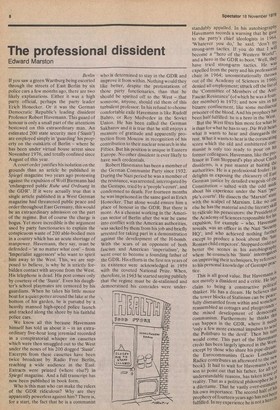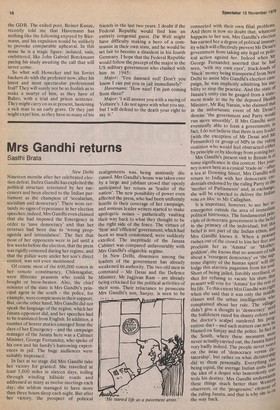The professional dissident
Edward Marston
Berlin If you saw a green Wartburg being escorted through the streets of East Berlin by six police cars a few months ago, there are two likely explanations. Either it was a high party official, perhaps the party leader Erich Honecker. Or it was the German Democratic Republic's leading dissident Professor Robert Havemann. This guard of honour is only a small part of the attentions bestowed on this extraordinary man. An estimated 200 state security men ('Stasis') are employed simply in 'guarding' his property on the outskirts of Berlin — where he has been under virtual house arrest since November 1976, and totally confined since August of this year.
A court order justifies his isolation on the grounds than an article he published in Spiegel magazine two years ago protesting against the expulsion of Wolf Biermann had 'endangered public Ruhe und Ordnung in the GDR'. If it were actually true that a single article published in a West German magazine had threatened public peace and order throughout East Germany, this would be an extraordinary admission on the part of the regime. But of course the charge is bogus. Yet more incredible is the argument used by party functionaries to explain the conspicuous waste of 200 able-bodied men in a country which has an acute shortage of manpower. Havemann, they say, must be defended — 'at no matter what cost' — from 'Imperialist aggressors' who want to spirit him away to the West. This, we are supposed to believe, is why he is strictly forbidden contact with anyone from the West. His telephone is dead. His post comes only by courtesy of the 'Stasis'. Even his daughter's school playmates are censored by his guardians. When he takes his little motor boat for a quiet potter around the lake at the bottom of his garden, he is pursu'ed by a heavily manned high-speed police launch and tracked along the shore by his faithful police cars.
We know all this because Havemann himself has told us about it — in an extraordinary five-hour long jeremiad recorded in a conspiratorial whisper on cassettes which were then smuggled out to the West under the noses of his 200 dogged 'Stasis'. Excerpts from these cassettes have been twice broadcast by Radio Free Berlin, reaching a wide audience in the East. Extracts were printed (where else?) in Spiegel magazine. And a full transcript has now been published in book form.
Who is this man who can make the rulers of the GDR ridiculous? Why are they apparently powerless against him? There is, for a start, the fact that he is a communist who is determined to stay in the GDR and improve it from within. Nothing would they like better, despite the protestations of those party functionaries, than that he should be spirited off to the West — that someone, anyone, should rid them of this turbulent professor. In his refusal to choose comfortable exile Havemann is like Rudolf Bahro, or Roy Medvedev in the Soviet Union. He has been called the German Sakharov and it is true that he still enjoys a measure of gratitude and apparently protection from Moscow in recognition of his contribution to their nuclear research in The Fifties. But his position is unique in Eastern Europe. No other dissident is ever likely to have such credentials.
Robert Havemann has been a member of the German Communist Party since 1932. During the Nazi period he was a member of the resistance, was arrested, interrogated by the Gestapo, tried by a 'people's court', and condemned to death. For fourteen months he was imprisoned in the same gaol as Erich Honecker. That alone would ensure him a place of honour in the GDR. But there is more. As a chemist working in the American sector of Berlin after the war he came into conflict with the American authorities, was sacked by them from his job and briefly arrested for taking part in a demonstration against the development of the H-bomb. With the scars of an opponent of both fascism and American 'imperialism', he went over to become a founding father of the GDR. His efforts in the first ten years of its existence were acknowledged in 1959 with the coveted National Prize. When, therefore, in 1963 he started saying publicly that the regime must be de-stalinised and democratised his comrades were under standably appalled. In his autobiographY Havemann records a warning that he gave to the party's chief ideologists in 1964, 'Whatever you do,' he said, 'don't try strong-arm tactics. If you do that I will become a "hero of the Western World'', and a hero in the GDR to boot.' Well, they have tried strong-arm tactics. He Wal expelled from the party and his professoria' chair in 1964; unconstitutionally throw° out of the Academy of Sciences in 1966; denied all employment; struck off the list of the 'Committee of Members of the Anti Fascist Resistance' (of which he was a foua" der member) in 1975; and now sits in his bizarre confinement, like some mediaeval prisoner of the blood. And his prophecy has been half fulfilled: he is a hero in the West' But the West fetes him more for what he is than for what he has to say. Die Welt heats what it wants to hear and disregards the rest. What it wants to hear is the coruscatiag scorn which the old and embittered CO munist is only too ready to pour on his former colleagues. Havemann, like the fessor in Tom Stoppard's play about Czee'l dissidents, is a past master at baiting t..,11e authorities. He is a professional foulertie delights in exposing the chicanery of East German justice by detailed exegesis of the Constitution — salted with the odd aSide about his experience under the Nazi 'Pecr plc's courts'. He dissects the 'Marxist' state with the scalpel of Marxism. Like no elle, else he has the material and the literary slcuf to ridicule his persecutors: the President 0' the Academy of Sciences responsible for Ills expulsion, for example — who, Havematal reveals, was an officer in the Nazi SecuritY HO', and who achieved nothing furtheer except to produce a book about the "tt Roman child emperors'. Stoppard couldnf better the scenes in his autobiograll where he counsels his 'Stasis' interrogat°e on improving their techniques, by refer'. to his personal knowledge of Gestapo PraC flee. i5 This is all good value. But Havemal 5 not merely a dissident and a critic. He '1 claim to being a constructive politif.i thinker. He has a dream. He believes di the tower blocks of Stalinism can be Peac°,1; fully dismantled from within and soma° reassembled as cottages and playgroull; the mixed development of democcalis communism. Furthermore he thinks dids can happen in the GDR, where it nee d 'only a few more external impulses to se ,11 the Politburo to the devil'. Then his tl171 would come. This part of the Haver°110, credo has been largely ignored in the We . except by those who share hisPiPe-dreallo' the Eurocommunists (Lucia Lorabarew Radice contributes an afterward to the tiviti book). It had to wait for Havernann's 0„0 son to point out that his father, for all tuof understandable reasons, has taken leav,ce is reality. That as a political philosopheriltes a dilettante. That he vastly over-estiM‘a11i5 his own importance. The second half 01 ell prophecy of fourteen years ago has notl/ fulfilled. In my experience he is not 3 her° the GDR. The exiled poet, Reiner Kunze, recently told me that Havemann has nothing like the following enjoyed by Biermann, and his expulsion would be unlikely to provoke comparable upheaval. In this sense he is a tragic figure: isolated, vain, embittered, like John Gabriel Borckmann pacing his study awaiting the call that will never come.
So what will Honecker and his Soviet backers do with the professor now, after his latest and most spectacular professional foul? They will surely not be so foolish as to make a martyr of him, as they have of Bahro, with a trial and prison sentence. They might carry on as at present, hastening a sick man to an early grave. Or they just might expel him, as they have so many of his friends in the last two years. I doubt if the Federal Republic would find him an entirely congenial guest. Die Welt might have difficulty making a hero of a communist in their own state, and he would be set fair to become a dissident in his fourth Germany. I hope that the Federal Republic would follow the precept of the major in the US military government who clashed with him in 1945: Major: 'You damned red! Don't you know I can put you in jail immediately!'
Havemann: 'How nice! I'm just coming from there!'
Major: 'I will answer you with a saying of Voltaire's. I do not agree with what you say, but I will defend to the death your right to say it.'



































 Previous page
Previous page